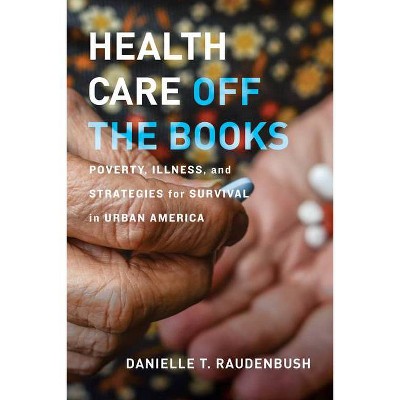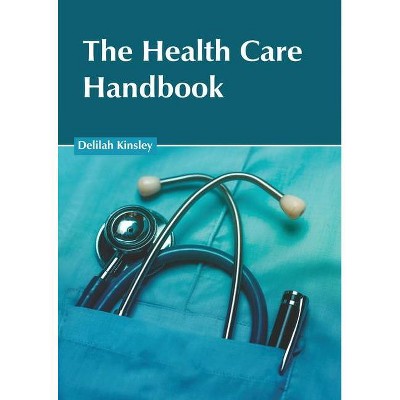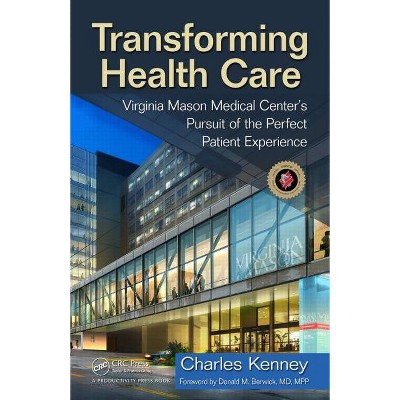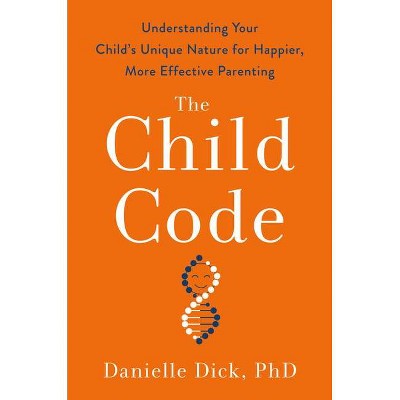Health Care Off the Books - by Danielle T Raudenbush (Hardcover)

Similar Products
Products of same category from the store
AllProduct info
<p/><br></br><p><b> About the Book </b></p></br></br>"Low-income African Americans in the United States face a fundamental tension when it comes to health care. Members of this group have higher rates of illness and disease compared to other groups and, at the same time, are more likely to face obstacles to accessing health care. Health Care Off the Books examines this tension, asking what people belonging to this group do when they have health problems but are unable to obtain health services. Drawing on a qualitative case study of an urban African American public housing development, Danielle T. Raudenbush reveals that health care for some low-income people is different from common scholarly and public conceptions. It is not simply that members of this group forgo health care or rely on safety-net facilities like community clinics and public hospitals, as is often assumed. Instead, some low-income people and some of the doctors that work with them transform the nature of health care delivery and co-construct an informal-formal hybrid health care system. In this system, health-related resources that originate in places like hospitals and clinics are distributed informally through people's social ties, including resources like pharmaceutical drugs, medical equipment, and insurance cards. This hybrid system is shaped by important neighborhood and interpersonal processes and becomes integral to how some people manage their health problems. While the health care strategies described in the book may at times be beneficial, they also have the potential to negatively affect people's health"--<p/><br></br><p><b> Book Synopsis </b></p></br></br><p>Millions of low-income African Americans in the United States lack access to health care. How do they treat their health care problems? In <i>Health Care Off the Books</i>, Danielle T. Raudenbush provides an answer that challenges public perceptions and prior scholarly work. Informed by three and a half years of fieldwork in a public housing development, Raudenbush shows how residents who face obstacles to health care gain access to pharmaceutical drugs, medical equipment, physician reference manuals, and insurance cards by mobilizing social networks that include not only their neighbors but also local physicians. However, membership in these social networks is not universal, and some residents are forced to turn to a robust street market to obtain medicine. For others, health problems simply go untreated.<br /><br /> Raudenbush reconceptualizes U.S. health care as a formal-informal hybrid system and explains why many residents who do have access to health services also turn to informal strategies to treat their health problems. While the practices described in the book may at times be beneficial to people's health, they also have the potential to do serious harm. By understanding this hybrid system, we can evaluate its effects and gain new insight into the sources of social and racial disparities in health outcomes.<br /> </p><p/><br></br><p><b> From the Back Cover </b></p></br></br>"<i>Health Care Off the Books</i> is an original and urgently needed study of how the most disadvantaged Americans seek access to health care. This unusually detailed account gives voice to both patients and doctors and offers insights into the difficult choices medical professionals must make when faced with the complex nature of social support and isolation among low-income urban African Americans. She shows that the line between the formal and informal in health care is blurry, as people use whatever means are at their disposal to access the resources--from drugs to wheelchairs--that they desperately seek but cannot afford. By turns informative and devastating, <i>Health Care Off the Books </i>is an important work."--Mario Luis Small, Grafstein Family Professor of Sociology at Harvard University and author of <i>Someone To Talk To: How Networks Matter in Practice</i> <p/> "Raudenbush breaks new ground by showing how low-income people, locked out of the formal health care system, are forced to turn to a shadow health care network for basic medical necessities. This gripping and beautifully written book is a must-read for anyone interested in poverty, health care, and the connections between them."--Judith A. Levine, author of <i>Ain't No Trust: How Bosses, Boyfriends, and Bureaucrats Fail Low-Income Mothers and Why It Matters</i> <p/> "<i>Health Care Off the Books</i> demonstrates how the creative strategies that people leverage to address a lack of resources, while perhaps helpful in the short run, can be deadly in the long run. This book is a scathing indictment of our refusal to see access to high-quality health care as a human right. It should be required reading for those interested in understanding the context and consequences of injuries of inequality."--Celeste Watkins-Hayes, Professor of Sociology and African American Studies at Northwestern University and author of <i>Remaking a Life: How Women Living with HIV/AIDS Confront Inequality</i> <p/> <br><p/><br></br><p><b> About the Author </b></p></br></br><b>Danielle T. Raudenbush</b> is Assistant Professor in the Department of Sociology at the University of California, San Diego.
Price History
Price Archive shows prices from various stores, lets you see history and find the cheapest. There is no actual sale on the website. For all support, inquiry and suggestion messagescommunication@pricearchive.us



















